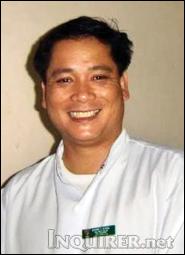Conviction of Ortega gunman draws int’l watchdog’s praise
MANILA, Philippines—The New York-based Human Rights Watch (HRW) has lauded the Philippine government for the conviction of the hired killer of environmentalist Gerry Ortega—the first conviction of an extrajudicial killing since President Benigno Aquino III came to office in 2010.
But it also urged the government to prosecute the mastermind and other accomplices in the killing of Ortega in Palawan in 2011.
HRW, an international nongovernmental organization, said it was nevertheless pleased with the first conviction for an extrajudicial killing.
On May 7, 2013, a court convicted Marlon Recamata for the Jan. 24, 2011, murder of Ortega and meted him 40 years imprisonment. Recamata was arrested moments after the shooting and subsequently confessed to the crime, implicating others.
“The conviction of the gunman in the killing of activist Gerry Ortega is an overdue milestone for the Aquino administration,” said Brad Adams, Asia director at Human Rights Watch.
Article continues after this advertisement“But the alleged mastermind is still at large and should not escape justice,” he said.
Article continues after this advertisementWhile in custody, Recamata identified his accomplices, among them, Rodolfo Edrad, a former soldier who allegedly coordinated the plot.
Edrad, in turn, pointed to Joel Reyes, the governor of Palawan from 2003 to 2010, as the mastermind.
Ortega had hosted a radio program on environmental issues and corruption that frequently criticized Reyes. The gun used in the murder was traced to a person who had served as Reyes’ provincial administrator.
Seven other suspects in the case were taken into custody. Five are awaiting trial, one suspect died of natural causes, while a second died under unclear circumstances.
According to the HRW, government officials and members of the security forces in the Philippines have been implicated in several hundred politically motivated killings.
Successive administrations have failed to obtain any convictions.
“The murder of Ortega, among the first extrajudicial killings during the Aquino administration, was one of the very few where the authorities gathered strong evidence and witnesses against the suspects,” the HRW said.
In June 2011, a Department of Justice panel formed to investigate the case recommended the filing of charges against four suspects. But it removed Reyes, his brother Mario and five others, citing lack of evidence.
After Ortega’s family protested the failure to charge Reyes and the others, the justice department created a new panel to reinvestigate the case, which in March 2012 proposed the filing of charges against Reyes, his brother and three others.
After arrest warrants were issued for Reyes and his brother, they evaded capture by fleeing the country. Their lawyers then went to the Court of Appeals which ruled in March 2013 that the charges against the Reyes brothers and the others should be dropped, citing judicial overreach by the justice department. The case is pending in the Supreme Court.
In its 2013 Impunity Index, the Committee to Protect Journalists ranked the Philippines as the third most deadly for journalists in the world—after Iraq and Somalia—with 55 unsolved killings of journalists in the past decade.
As president, Mr. Aquino has promised to end impunity for extrajudicial killings. The number of killings has decreased significantly since the administration of his predecessor, President Gloria Macapagal-Arroyo, although they have not ended.
The government has passed several key pieces of legislation on human rights. Yet the Aquino administration has made little progress in bringing perpetrators of serious human rights violations to justice and ending the impunity.
“This first conviction was easy, as the gunman had confessed,” Adams said.
“Now the government has to do the more difficult work of successfully prosecuting those who ordered Ortega’s murder. This would demonstrate that the government is finally getting serious about political killings,” he added.
